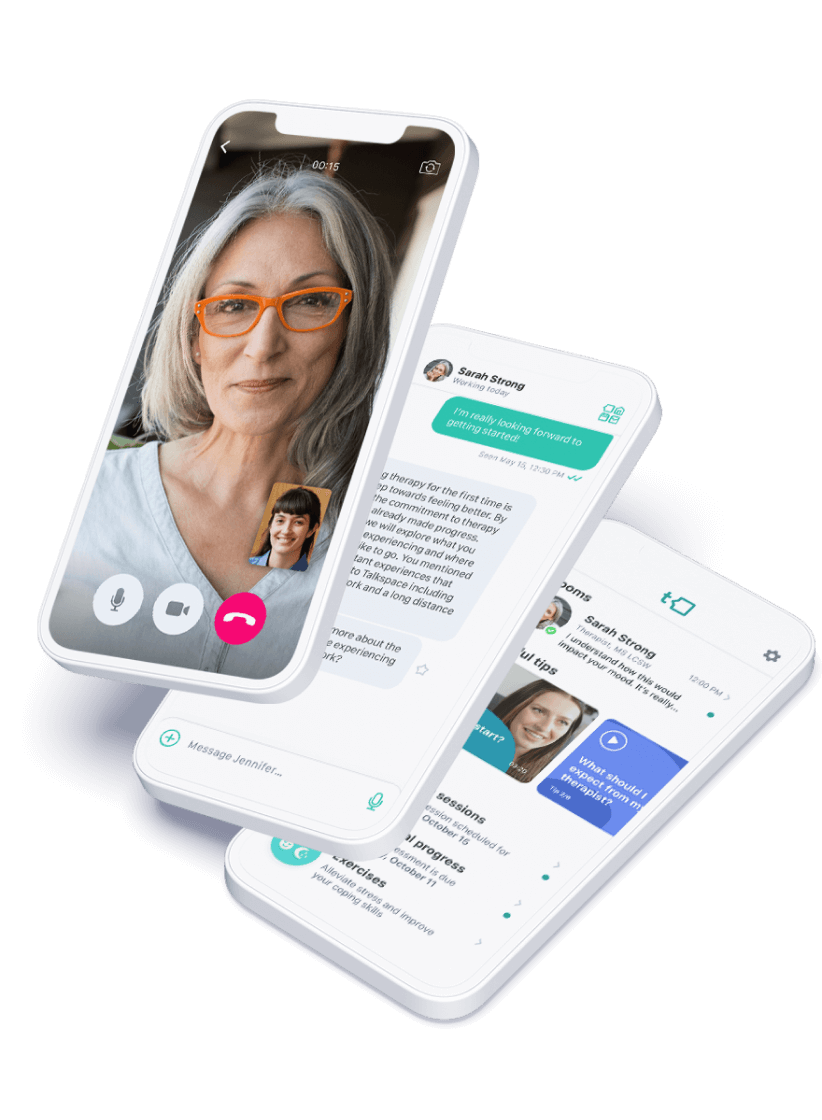Depression
Read Time: 6 MinutesUpdated On: November 2, 2023
Overview
As of 2020, an estimated 8.4% of adults in the US — 21 million people — have had at least one or more bouts with major depression. There are multiple treatment protocols for depression, including various forms of psychotherapy, depression medication, and a combination of two. For some people, a specific form of psychotherapy called dialectical behavior therapy (DBT) can be an effective approach to treating depression.
DBT therapy uses four techniques to assist with emotional dysregulation, which is common in depression. These DBT therapy techniques include mindfulness, distress tolerance, emotional regulation, and interpersonal effectiveness.
Read on to learn more about the science behind DBT and depression and how this approach to behavioral therapy can be an effective part of your treatment plan.
Can DBT be Used for Depression?
DBT was originally created in the 1970s to treat symptoms related to borderline personality disorder, but it’s also been found to be a successful way to treat several other mental health conditions, including depression and bipolar disorder. Dialectical behavioral therapy is a comprehensive approach to treating depression that uses sessions of individual therapy session, group therapy, coaching, and homework.
In one recent study, participants who trained in DBT-related emotional regulation and mindfulness had a significant reduction in depressive symptoms. Another study’s results also supported the idea that participation in DBT training can be an effective way to help those with major depressive disorder (MDD). DBT skills for depression help people with MDD by teaching them how to process emotions appropriately. Ultimately, the learned skills can reduce depressive symptoms for some people.
“DBT is a widely recognized therapy that was initially created as a treatment for people with chronic suicidality. It’s commonly used with people who have been diagnosed with borderline personality disorder, depression, anxiety, and trauma-related disorders.”
Expert Insight
 Licensed Clinical Social Worker (LCSW), BCD, C-DBT Ashley Ertel
Licensed Clinical Social Worker (LCSW), BCD, C-DBT Ashley Ertel
Benefits of DBT for Depression
DBT treatment uses specific techniques to teach emotional regulation skills, enabling people with depression to gain a better understanding about what healthier emotions and responses should look like.
DBT is a collaborative process between patient and therapist to identify both strengths as well as maladaptive thoughts and behaviors. The idea is to build upon existing positive thought processes and behaviors while helping someone challenge harmful beliefs.
This approach can help patients with depression:
- Enhance their quality of life
- Have better social skills
- Improve their self-image
- Take an interest in social activities again
- Have the ability to concentrate or focus on things
- Decrease physical symptoms of depression such as body aches or headaches
How Quickly Does DBT for Depression Work?
While DBT programs can last anywhere from 6 months to a year, many people find that they notice gradual improvements along the way.
DBT treatment can help you manage distressing emotions and develop practical coping skills. Your therapist will help you find a balance between acceptance and change. Eventually, harmful and unhealthy thoughts will decrease, and you’ll begin to experience fewer depression symptoms.
It’s important to attend DBT sessions regularly and participate fully. While DBT is a commitment, it can be very worthwhile. Online DBT therapy can make this form of treatment more accessible.
“Full-scale DBT, which includes individual and group therapy appointments, often takes about one full year. However, there are several modifications that have been made to the protocol for people who are not in need of the entire course of treatment. Many people with depression can see positive results within the first 12 weeks of therapy.”
Expert Insight
 Licensed Clinical Social Worker (LCSW), BCD, C-DBT Ashley Ertel
Licensed Clinical Social Worker (LCSW), BCD, C-DBT Ashley Ertel
DBT Techniques Essential for Depression
There are four main strategies or techniques that DBT employs. They each focus on a different area and have specific goals toward relieving symptoms and helping you get your life back, free from the grips of depression.
“As you work through DBT, you’ll cycle through the four main components — usually starting with mindfulness and then adding in distress tolerance, emotion regulation, and interpersonal effectiveness. Each component contains unique skills that are designed to help you create a life that’s worth living.”
Expert Insight
 Licensed Clinical Social Worker (LCSW), BCD, C-DBT Ashley Ertel
Licensed Clinical Social Worker (LCSW), BCD, C-DBT Ashley Ertel
Mindfulness
Mindfulness is one of the key, main, foundational elements of the DBT process. It teaches someone who’s living with depression how to identify their emotions. Beyond that, it helps them label what they’re feeling so they can appropriately address unhealthy thought processes. In addition, mindfulness teaches people how to be present and learn to really stay in the moment.
The mindfulness component also includes behavioral activation skills, including:
- Choosing to do the opposite of what your emotions tell you when you know healthier reactions are possible
- Accumulating positive emotions
- Engaging in activities that foster a sense of competency
The mindfulness module in DBT helps someone develop the skills they need so they can quickly, easily, and almost naturally begin to utilize mindfulness skills in their daily life.
Like all DBT skills for depression, mindfulness requires practice before it can become an instinctual response, though. However, rest assured, if you practice it long enough, mindfulness can radically reduce levels of stress and depressive symptoms, ultimately increasing your ability to find happiness in your day-to-day life.
Distress tolerance
Distress tolerance is the ability to encounter and withstand adverse emotional circumstances. Unfortunately, people with depression often have a low distress tolerance, so this DBT module is critical when treating symptoms of depression.
Distress tolerance skills include the use of:
- Distraction techniques
- Radical acceptance
- Being in the moment
- Self-soothing
All these mindfulness skills can help improve depressive symptoms. Another important aspect of this part of DBT is that people are taught to identify triggers for self-harm or suicide. As they learn to identify these triggers, they’re more able to employ effective techniques to change how they’re feeling and the negative thought patterns they’re having.
Emotional regulation
Impaired emotional regulation is the hallmark symptom of depression. Emotional dysregulation can cause overwhelming feelings and negative emotional responses. Learning emotional regulation skills helps people with depression learn to better-cope with their heightened feelings in more effective ways.
Emotional regulation skills include:
- Identifying and naming emotions
- Decreasing the frequency of unpleasant feelings
- Reducing vulnerability to emotions
- Managing and reducing emotional suffering
Interpersonal effectiveness
Interpersonal effectiveness may be the last of the DBT techniques, but it’s just as critical as the others. Interpersonal skills can teach people how to change and improve their relationships.
Most people who live with and are trying to manage depression struggle with relationships. A tendency to withdraw socially, combined with a common inability to ask for help, means that deep connections and trust can both be issues, stunting meaningful relationships before they have a chance to develop.
Essentially, interpersonal effectiveness means that:
- You’re able to ask for what you want or need
- You can say no to requests when appropriate
To put interpersonal effectiveness skills into practice, people with depression need to determine their goal for social interaction and pinpoint how they can achieve the desired outcome. Dialectical behavior therapy can be effective in both these arenas.
Exploring DBT Therapy with Talkspace
If you or someone you care about is struggling with depression and treatment hasn’t been helpful or effective yet, you might want to consider utilizing DBT skills for depression — and Talkspace is a great resource for you to get started.
Talkspace is an online therapy platform that can help you get the critical therapy you need to manage your depression. Our licensed therapists are there for you, offering convenient, affordable, and accessible therapy when, how, and where you need it most. Check out Talkspace today to see how DBT, whether it’s DBT for depression, DBT for anxiety, or DBT for bipolar disorder, can change your life forever.
See References
-
Major Depression
National Institute of Mental Health (NIMH). Published 2022. Accessed July 15, 2022.
-
Combining emotion regulation and mindfulness skills for preventing depression relapse: a randomized-controlled study
Elices, Matilde et al. Borderline personality disorder and emotion dysregulation vol. 4 13. 5 Jul. 2017, doi:10.1186/s40479-017-0064-6. Accessed July 15, 2022.
-
Change in emotional processing during a dialectical behavior therapy-based skills group for major depressive disorder
Feldman, Greg et al. Behaviour research and therapy vol. 47,4 (2009): 316-21. doi:10.1016/j.brat.2009.01.005. Accessed July 15, 2022.

Ashley Ertel, LCSW, is a Nationally Board Certified Licensed Clinical Social Worker. She has over a decade of experience specializing in trauma and depression, working primarily with first responders, military personnel, and veterans, and sexual assault survivors.
Related Articles About Depression
View all articles
What to Do if Your Teenager is Making You Feel Depressed

Post-Weaning Depression: Recognize the Signs & Find Support

How to Think Positive When Depressed: Techniques for a Brighter Outlook

Have You Fallen Out of Love, or Are You Depressed?

How to Prevent Postpartum Depression

How to Explain Depression to Someone

Are There Stages of Depression?

Can Adderall Cause Depression?

Can Depression Cause Memory Loss?


